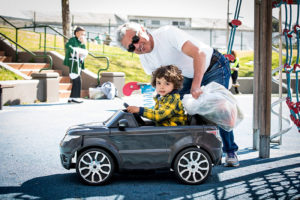For many in our community, March 2020 is when “the village collapsed.” Over two years later, this is still the reality for countless parents across our counties. Financial hardship and food insecurity, among other things, have made it hard to get back on their feet – much less return to the “normal” others may be experiencing.
Sarah is a single mom of two, who lost her job as a civil engineer shortly after shelter-in-place went into effect. She soon began coming to Rosa Parks Pop-up Pantry for groceries to feed her then 4- and 6-year-olds. When we met with her a few weeks ago, she carefully loaded groceries into a stroller before stopping to talk about her experiences parenting during the last two years. “It’s very difficult to juggle a career, especially when there’s instability. You’re just on your own. My own family was too afraid to help.”
Challenges of Pandemic-era Schooling
A lack of support characterized the last year and a half of online school for both kids and parents. Caretakers across the globe can empathize with the constant balancing act Sarah describes: “It was very challenging to have two very young kids at home. I spent all my time figuring out remote schooling and food and taking the kids out to grassy fields to play.”
Luckily, the recently passed Universal School Meals (USM) Program, which targets school children K-12, is already making a difference for Sarah’s children since they returned to in-person school in late 2021. “It’s very helpful. It can cover breakfast and lunch for the kids, so it’s huge.”
However, preschoolers are not covered by USM, so parents like Arlesia are left to pick up the slack and pack lunches. Arlesia and her 3-year-old daughter Juliana have been coming to Rosa Parks Pop-up Pantry for about 3 months, following a rough 2021 for the entire family. Arlesia, her husband, and Juliana all dealt with serious health scares last year, and Arlesia has been unable to find work since losing her job as a restaurant server and event planner in 2020. Preschool tuition is a financial strain while the family relies on her husband’s income, but for Arlesia, the impact school has had on Juliana is priceless. Her face glows with pride when describing Juliana’s progress in the last 10 months.
“Tuition is rough, but it’s for my daughter. Especially in the past few years when kids haven’t had that much interaction with other kids, it’s really affecting their development. Just from August to now, I can’t believe how much she grew and developed.”
 Other parents are more hesitant to let go of remote or homeschooling. Farzad is the single dad of 3-year-old Mehdi, as well as a musician, small business-owner, and participant at Cesar Chavez Pop-up Pantry. Farzad watches his son drive a toy car around the playground and sighs, shaking his head when asked about in-person preschool. He doesn’t “want Mehdi to go until COVID is over,” citing health concerns like maskless and unvaccinated children.
Other parents are more hesitant to let go of remote or homeschooling. Farzad is the single dad of 3-year-old Mehdi, as well as a musician, small business-owner, and participant at Cesar Chavez Pop-up Pantry. Farzad watches his son drive a toy car around the playground and sighs, shaking his head when asked about in-person preschool. He doesn’t “want Mehdi to go until COVID is over,” citing health concerns like maskless and unvaccinated children.
Self-Care and Systemic Change
Despite the struggles and uncertainty of the past two years, parents seem generally hopeful about the future – and a chance to tend to their own needs and wants, as well as their children’s.
Arlesia pauses when asked what she would do with some free time. “I haven’t focused on my health because I’m making sure the rest of the family is taken care of. I love doing crafts and photography, things with my hands. It drowns out all the concerns because you’re focused on making something beautiful.” She smiles. “I try to keep it positive because at the end of the day, we’re going to make it.”
Farzad is similarly optimistic, and excited for the revival of live music. “I play guitar, and I’m known for Persian flamenco — I pioneered it. I’ve been playing in the Bay Area since ‘85. I’ll be starting to gig again soon, hopefully. Things are changing. I’m seeing it already.”
For Sarah, hope lies in systemic change and providing safety nets for caretakers.
“COVID took more mothers out of the workforce than has ever happened since World War II. It really opened my eyes as to how the US doesn’t support caretakers. And if we can’t feed our kids, what kind of society are we, right?”
Our advocacy efforts
Learn how we're pushing to improve safety nets for parents, kids, and families.
Learn more


Share